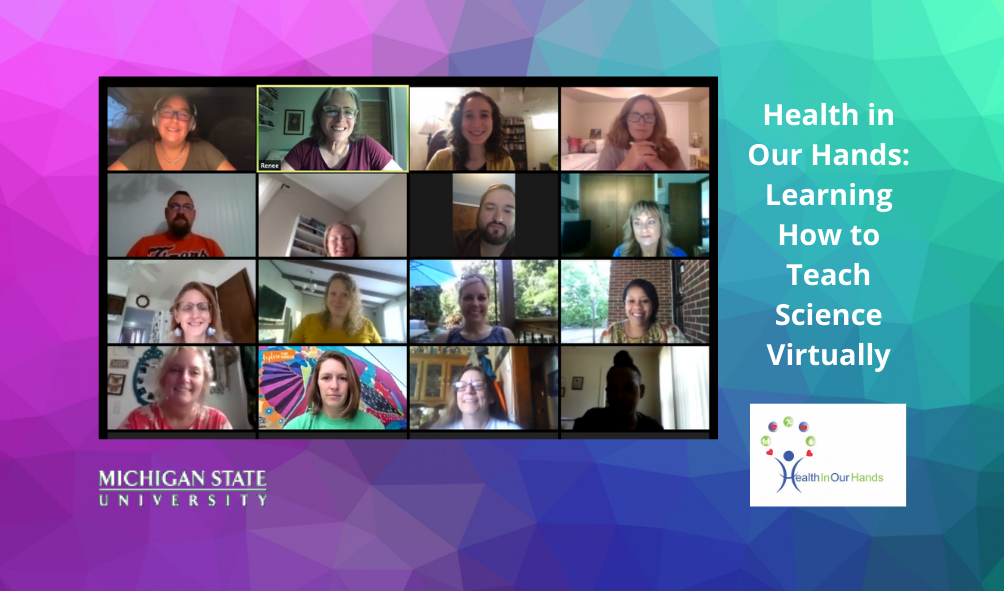Amidst the ongoing COVID-19 pandemic, more and more classrooms are moving partially or completely online. The shift is creating many changes in the ways we think about learning; teachers in particular are having to adapt quickly in order to engage students virtually. The challenges of doing so were a main topic of discussion during Health in Our Hands’ professional learning workshop, which took place virtually at the end of July.
For those who may not be familiar, Health in Our Hands (HiOH) is a project led by CREATE for STEM, in association with several other education, health and community partners from the Flint/Genesee area. Using the science curriculum developed through the HiOH project, students learn about gene-environment interactions, natural selection, and evolution. Most importantly, they learn about these concepts by applying them to important community health issues that affect their lives, such as diabetes and addiction. For their final project, students conduct an action research project to improve their school or neighborhood to help prevent or reduce diabetes and addiction. Students present the results and recommendations at a Youth Health Summit to their peers, family and community. CREATE for STEM received funding for this project from the Science Education Partnership Award, National Institute of General Medical Sciences.
As an important part of implementing the curriculum in classrooms, the HiOH team has led professional learning (PL) workshops and seminars for participating teachers for several years. However, the workshop this summer marked the first time the PL was presented completely online. During the PL, the HiOH team led by research associate Consuelo Morales tried out many of the same virtual learning strategies with the teachers that they can use with their own classes, using technology such as Zoom and Jamboard.
“Hosting the workshop virtually really gave us insights into the challenges teachers are dealing with right now,” says Morales. “Almost all of the districts that currently use the HiOH curriculum are teaching remotely this semester, making these discussions an essential component of the workshop.” Many of the discussions included space for teachers to ask questions and strategize together about ways to approach the HiOH curriculum and their lessons in general, learning to use technology as a tool rather than a hindrance.
Despite the move to an online forum, the number of districts represented for the four-day workshop was even higher this summer than previous years. Teachers resoundingly said that they appreciated the opportunity to work through curriculum virtually and try out new strategies for teaching online.
When asked what she liked best about the PL, Ashley Booker, returning 8th grade teacher from Atherton Community Schools responded, “Seeing the curriculum in action and the facilitators! I was able to see the curriculum and how it's going to be enacted. Since we will start online this fall, we will be troubleshooting as we go. So, I appreciate the follow-up Professional Learning Community sessions.”
As teachers start using the HiOH curriculum in their classes this fall, the HiOH team will continue to host bi-monthly virtual learning sessions. These will give teachers an opportunity to discuss their experiences with HiOH in class, figure out what’s working and what isn’t, and build upon their understanding of the content as they move forward through the curriculum. It’s unclear how long classrooms will have to remain remote, but with supportive virtual learning opportunities like these, the future of online learning is bright.
HiOH is a project lead by the CREATE for STEM Institute at Michigan State University in collaboration with the Health in Our Hands-Flint/Genesee Partnership: Community Based Organization Partners of Flint, CRIM Foundation, Flint Community Schools, Atherton Community Schools, Genesee County Health Department, Genesee Intermediate School District, Genesys Health System, Greater Flint Health Coalition, Health Alliance Plan, Michigan State University (Human Medicine & Extension) and the University of Michigan-Flint (Discovering PLACE).
(written by Katherine Stark)


